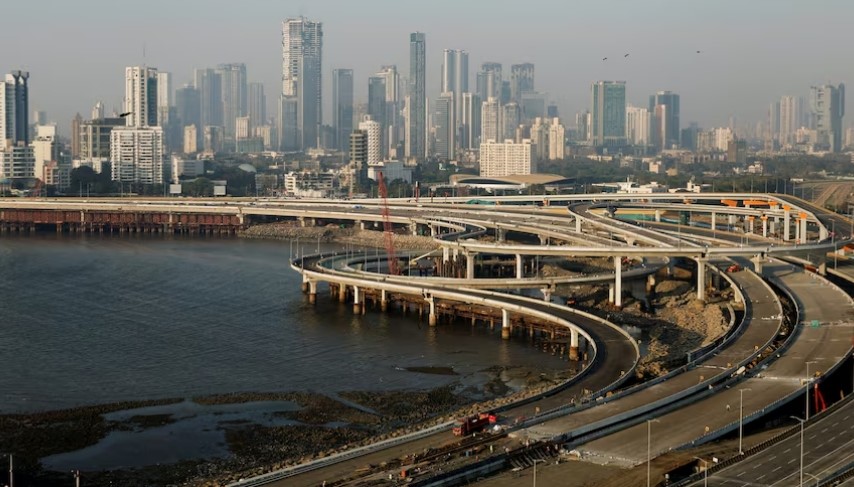India’s Economic Inequality to Persist Despite GDP Growth: Reuters Poll
India’s GDP is booming, growing over 8% last fiscal year, yet economic inequality remains stark. A Reuters poll reveals 85% of experts doubt inequality will decrease in the next five years. Despite a roaring stock market, over 800 million people receive free food grains. Experts argue that reducing inequality needs proactive government intervention. High youth unemployment and a shrinking middle class highlight the need for inclusive growth policies.
Economic Inequality Explained
Economic inequality refers to the disparity in wealth and income distribution among individuals in a society. In India, despite high GDP growth, a significant portion of the population remains in poverty, while a small elite hold substantial wealth. This disparity can hinder overall economic development and social stability. Addressing economic inequality often requires targeted government policies to improve education, healthcare, and job opportunities for the disadvantage.
Learn more↗
Source: Reuters
Flipkart to Launch ‘Flipkart Minutes’ for 15-Minute Deliveries
Flipkart is set to enter the quick commerce market with ‘Flipkart Minutes,’ aiming for 15-minute deliveries by mid-July. This move marks Flipkart’s third attempt in the sector, following less successful ventures. The company plans to leverage its supply chain for electronics, groceries, and essentials. The quick commerce market in India, valued at $3.34 billion in 2024, is expected to grow to $9.95 billion by 2029, driven by key players like Blinkit, Zepto, and Instamart.
Quick Commerce Explained
Quick commerce, also known as q-commerce, refers to the rapid delivery of goods, typically within minutes of an order being placed. This model focuses on small quantities of everyday essentials, leveraging local warehouses and advanced logistics to meet consumer demand for speed and convenience. It is a growing trend, especially in urban areas, driven by the increasing consumer expectation for fast and reliable service.
Learn more↗
Source: Business Today
India Proposes to be Key Node for Diamond Verification
India, importing 90% of the world’s rough diamonds, proposes to the EU that it should be a key node for verifying the origin of diamonds, especially to check if Russian diamonds are entering sanctioned markets. At a Brussels meeting, Indian officials suggested that India’s existing infrastructure for 3D scanning and profiling could make the process more efficient than using Belgium. The proposal aims to avoid disruptions as the sanctions regime tightens.
Diamond Verification Explained
Diamond verification ensures that diamonds come from legitimate sources and not conflict zones. This process involves 3D scanning, profiling, and using blockchain technology to track a diamond’s origin from the mine to the market. By verifying origins, countries can enforce sanctions and prevent illegal trade. India’s infrastructure and expertise in cutting and polishing diamonds position it as an efficient hub for this verification process.
Learn more↗
Source: Economic Times
India Drops to 15th Place in FDI Rankings Amid 43% Decline in Inflows
India has fallen to 15th place in the 2023 World Investment Ranking, with foreign direct investment (FDI) inflows dropping by 43% to $28 billion, per UNCTAD. This is a significant drop from last year’s 8th place with $48 billion. While Brazil, Canada, Germany, and Mexico improved their positions, the US maintained the top spot with $311 billion. Despite the drop, India excelled in greenfield projects, ranking fourth globally with 1,058 projects.
Foreign Direct Investment (FDI) Explained
Foreign Direct Investment (FDI) involves an investment from a party in one country into a business or corporation in another country with the intent to establish a lasting interest. FDI includes mergers, acquisitions, building new facilities, reinvesting profits earned from overseas operations, and intra-company loans. It’s crucial for economic growth, bringing in capital, skills, technology, and jobs to the host country.
Learn more↗
Source: India Blooms
Coca-Cola India Unveils 100% rPET Bottles in Odisha
Coca-Cola India has launched 100% recycled polyethylene terephthalate (rPET) bottles in a 250ml Affordable Small Sparkling Package (ASSP) format in Odisha. This initiative, led by Hindustan Coca-Cola Beverages, aligns with Coca-Cola’s environmental goals, achieving a 36% reduction in emissions compared to traditional packaging and a 66% decrease in the overall carbon footprint. This move supports Coca-Cola’s World Without Waste goal to use 50% recycled content in bottles by 2030.
Recycled Polyethylene Terephthalate (rPET)
Recycled polyethylene terephthalate (rPET) is plastic that has been reprocessed from used PET bottles and containers. This recycled material maintains the same properties as virgin PET, making it suitable for packaging, especially food and beverages. Using rPET helps reduce plastic waste and lower carbon emissions.
Learn more↗
Source: Yahoo Finance
IRDAI Prohibits Advertising ULIPs as Investment Products
The Insurance Regulatory and Development Authority of India (IRDAI) has barred insurers from advertising Unit Linked Insurance Plans (ULIPs) and index-linked products as investment products. The master circular dated June 19, 2024, outlines advertising guidelines for insurers, emphasizing transparency and risk disclosure. Insurers must ensure ads do not exaggerate benefits, denigrate competitors, or obscure associated risks. Detailed, accurate information on risks, charges, and performance history must be provided in simple language.
Unit Linked Insurance Plan (ULIP)
A Unit Linked Insurance Plan (ULIP) is a hybrid financial product combining insurance and investment. Premiums paid are split between life insurance coverage and investment in funds chosen by the policyholder, such as equity or debt. ULIPs offer potential for higher returns but come with investment risks due to market fluctuations. Understanding the risks and associated charges is crucial before investing in a ULIP.
Learn more↗
Source: Economic Times
Ex-OpenAI Cofounder Launches Safe Superintelligence Inc. for Secure AI Development
Ilya Sutskever, cofounder of OpenAI, has launched Safe Superintelligence Inc. to focus on the safe creation of superintelligent AI systems, free from commercial pressures. The new venture, co-founded with Daniel Gross and Daniel Levy, is based in Palo Alto and Tel Aviv. This move follows Sutskever’s departure from OpenAI and reflects his commitment to prioritizing AI safety and security over product development cycles.
Superintelligent AI
Superintelligent AI refers to artificial intelligence that surpasses human intelligence in all aspects, including creativity, problem-solving, and emotional intelligence. The development of superintelligent AI poses significant challenges and risks, including ethical concerns and potential misuse. Ensuring the safe and secure creation of these advanced systems is crucial to prevent unintended consequences.
Learn more↗
Source: Live Mint
Indian Spirits Brands Dominate Global Growth, Report Finds
A third of the world’s 30 fastest-growing spirits brands are Indian, according to Drinks International. Leading the charge is Iconiq White Whisky, selling 1.6 million cases in 2023. Diverse brands, including Courier Napoleon and Mansion House brandy, Morpheus brandy, Magic Moments vodka, and 1965 rum, also thrive. India, now the largest country by population, remains a key market despite excise challenges, with notable growth and premiumization efforts bolstering domestic and export markets.
Premiumization
Premiumization is the trend of consumers shifting towards higher-quality, often more expensive products. In the spirits industry, this involves investing in superior ingredients, crafting unique flavors, and emphasizing brand heritage. Premiumization drives growth by appealing to consumers’ desire for luxury and exclusivity, leading to increased market share and higher profit margins.
Learn more↗
Source: Economic Times
PM-KISAN Boost: Modi Distributes Rs 20,000 Crore to 9.26 Crore Farmers
Prime Minister Narendra Modi disbursed the 17th installment of the PM-KISAN scheme, totaling over Rs 20,000 crore, benefiting 9.26 crore farmers. Since its launch in 2019, the scheme has supported over 11 crore families with Rs 3.04 lakh crore. Eligible farmers receive Rs 6,000 annually, with six key eligibility criteria and four exclusion factors outlined. More than one lakh farmers have voluntarily given up benefits in the past year.
PM-KISAN Scheme
The PM-KISAN (Pradhan Mantri Kisan Samman Nidhi) scheme is an initiative by the Indian government to provide financial support to farmers. Eligible farmer families receive Rs 6,000 per year, disbursed in three equal installments directly to their bank accounts. The scheme aims to enhance farmers’ financial stability between crop cycles.
Eligibility Criteria:
- Ownership of Land: Must own cultivable land.
- Cultivable Land: Applies to all land sizes.
- Family Criteria: Includes husband, wife, and minor children.
- Age Criteria: No age restriction.
- Income Criteria: No income limit; excludes institutional landholders and retired government officials with high pensions.
- Citizenship: Must be an Indian citizen.
Exclusion Factors:
- Institutional landholders.
- Former/present holders of constitutional posts.
- Former/present ministers, MPs, and similar officials.
- High-income professionals like doctors, engineers, and lawyers.
Learn more↗
Source: Financial Express
India’s Unicorn Boom: 152 New Billion-Dollar Startups Expected by 2029
India is set to add 152 new unicorns—startups valued over $1 billion—from 31 cities in the next 3-5 years, increasing the current count of 67, according to the ASK Private Wealth Hurun India Future Unicorn Index 2024. This year saw 25 startups drop off the list, 12 downgraded from gazelle to cheetah, and 10 promoted from cheetah to gazelle. Most future unicorns were founded in 2015, with a focus on software and services.
Unicorns, Gazelles, and Cheetahs in Startup Ecosystem
In the startup world, unicorns, gazelles, and cheetahs represent different stages of growth and valuation.
Unicorn: A privately-held startup valued at over $1 billion. India is expected to see a rise in such companies in the coming years.
Gazelle: A startup likely to become a unicorn within three years. These are typically high-growth companies.
Cheetah: A startup expected to achieve unicorn status within five years. They show strong potential but are slightly behind gazelles in their growth trajectory.
These classifications help investors and stakeholders identify promising companies and track their progress in the competitive startup ecosystem.
Learn more↗
Source: Economic Times
India Inc’s Wishlist for Budget: Lower Income Tax, Higher Capex
India Inc has urged Finance Minister Nirmala Sitharaman to reduce income tax for lower-income groups, boost capital expenditure, and tackle food inflation ahead of the Union Budget 2024-25. Key recommendations include infrastructure development, support for MSMEs, tax simplification, and fostering innovation. Industry bodies such as CII, Ficci, and Assocham emphasized the importance of maintaining economic growth, prioritizing capex, and improving ease of doing business. The full Budget is expected to be presented next month.
Budget Wishlist Explained
Income Tax Relief: Lowering the income tax burden for individuals, especially those in lower-income brackets, to increase disposable income and stimulate demand.
Capital Expenditure (Capex): Increasing government spending on infrastructure, education, and healthcare to stimulate economic growth and create jobs. Capex refers to funds used by a company or government to acquire, upgrade, and maintain physical assets.
Food Inflation Control: Implementing measures to contain rising food prices, which can erode purchasing power and economic stability.
MSME Support: Strengthening the Micro, Small, and Medium Enterprises (MSME) sector, which is crucial for employment and economic growth. This includes easing regulations and providing financial support.
Ease of Doing Business: Simplifying tax systems and reducing bureaucratic hurdles to foster a more business-friendly environment.
Production Linked Incentive (PLI) Schemes: Enhancing and streamlining incentive schemes that encourage companies to increase production in India, thereby boosting manufacturing and exports.
Learn more↗
Source: MSN
Daibiru Invests Rs 1,000 Crore in Gurgaon’s Atrium Place
Daibiru Corporation, a subsidiary of Mitsui O.S.K. Lines, has invested Rs 1,000 crore in an under-construction office complex in Gurgaon, developed by DLF and Hines. This move facilitated the exit of Abu Dhabi Investment Authority, with Hines holding a 33% stake in the joint venture. The project, Atrium Place, spans 2.88 million square feet across 11.76 acres, and is set for completion in 2025. Both companies also created Daibiru Hines Trust at GIFT City, Gujarat.
Concepts Explained
Joint Venture: A business arrangement where two or more parties agree to pool their resources to accomplish a specific task, which in this case, is developing the office complex Atrium Place. Hines holds a 33% stake in this joint venture.
Grade A+ Office Project: High-quality office buildings with superior infrastructure, location, and amenities, attracting premium tenants.
Real Estate Investment: The purchase, ownership, management, rental, and/or sale of real estate for profit. Daibiru’s investment in Gurgaon’s office complex is an example of such an investment, signifying confidence in India’s real estate market.
Learn more↗
Source: Economic Times


Leave a Reply